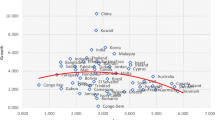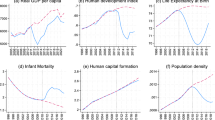Abstract
Why do countries delay stabilizations of large and increasing budget deficits and inflation? And what explains the timing of reforms? We use the war-of-attrition model to guide our empirical study on a vast sample of countries. We find that stabilizations are more likely to occur when times of crisis occur, when new governments take office, when governments are “strong” (that is, presidential systems and unified governments with a large majority of the party in office), and when the executive branch faces fewer constraints. The role of external inducements like IMF programs has at best a weak effect, but problems of reverse causality are possible.
Similar content being viewed by others
Notes
For a recent discussion of the political economy of structural reforms in the labor and product markets, see Boeri (2005). A special branch of the reform literature analyzes postcommunist transformations, but, by now, ex-communist countries are very much like other countries; therefore a special treatment of them does not seem necessary any longer (see Shleifer and Treisman, 2000).
As Drazen and Grilli (1993) point out, accumulation of debt is unnecessary as long as the inflation tax is more distortionary than the income tax.
See Hsieh (2000) for an extension of the model on this point.
More precisely, a cost parameter is drawn from the same well-behaved distribution; one group knows its own parameter and knows that the other group’s parameter is drawn by the same distribution.
It is straightforward to compute the lifetime utility of the two groups (winner and loser) because the model assumes that no more crises will occur and the economy will be in the stable equilibrium forever.
More precisely, the expected time of a stabilization is positive—that is, a stabilization does not occur immediately. It would occur immediately if one group had the maximum possible realization of the cost parameter. Also, the analysis focuses on symmetric equilibria.
See also Alesina (1988) for a discussion of several historical cases of debt reduction in line with the war-of-attrition model.
With specific reference to Latin America, Lora (2001) finds inconclusive evidence on this point.
For instance, Persson and Tabellini (2003) suggest that presidential systems follow more procyclical fiscal policies.
IMF conditionality may work better if the country feels that it “owns” the program, that is, if the program is not imposed on the country. For a recent discussion of the political economy of IMF conditionality and its relationship with domestic politics, see Drazen (2002).
Deficit over GDP for country i at time t is computed by redefining surpluses, variable series 80 … ZF. The consumer price index series are the variable series 64 … ZF. We also checked our results employing the GDP deflator from series 99BIPZF to compute the inflation rate for country i at time t. Results are robust.
The World Bank database is available online at http://www.worldbank.org/research/projects/finstructure/database.htm
We also refer the reader to the original source book of the DPI database for more information on the variables. It can be found at http://siteresources.worldbank.org/INTRES/Resources/DPI2004_variable-definitions.pdf
This is an issue particularly pressing for the cross-sectional empirical literature on the effects of political institutions. See the discussions in Persson and Tabellini (2003) and in Acemoglu (2005). Clearly, misspecification of the interaction term is possible in this panel, but by focusing on the orthogonal components across time and countries, the likelihood that our results would be solely driven by omitted variable bias is smaller than in the cross-section.
In this instance, it is sensible to discuss the role of β1 because EXECONST presents substantially higher within-country variation than PRES.
References
Acemoglu, Daron, 2005, “Constitutions, Politics and Economics: A Review Essay on Persson and Tabellini’s ‘The Economic Effect of Constitutions,’” NBER Working Paper No. 11235 (Cambridge, Massachusetts: National Bureau of Economic Research).
Aghion, Philippe, Alberto Alesina, and Francesco Trebbi, 2004, “Endogenous Political Institutions,” Quarterly Journal of Economics, Vol. 119 (May), pp. 565–611.
—, 2005, “Choosing Electoral Rules: Theory and Evidence from US Cities” (unpublished; Cambridge, Massachusetts: Harvard University).
Akhmedov, Akhmed, and Ekaterina Zhuravskaya, 2004, “Opportunistic Political Cycles: Test in a Young Democracy Setting,” Quarterly Journal of Economics, Vol. 119 (May), pp. 1301–38.
Alesina, Alberto, 1988, “The End of Large Public Debts” in High Public Debt: The Italian Experience, ed. by F. Giavazzi and L. Spaventa (Cambridge: Cambridge University Press).
—, and Silvia Ardagna, 1998, “Tales of Fiscal Adjustment,” Economic Policy, Vol. 13 (October), pp. 487–545.
—, and Allan Drazen, 1991, “Why Are Stabilizations Delayed?” American Economic Review, Vol. 81 (December), pp. 1170–88.
—, and Edward Glaeser, 2004, Fighting Poverty in the US and Europe: A World of Difference (Oxford: Oxford University Press).
Alesina, Alberto, Roberto Perotti, and José Tavares, 1998, “The Political Economy of Fiscal Adjustments,” Brookings Papers on Economic Activity, 1 Brookings Institution.
Alesina, Alberto, Nouriel Roubini, and Gerald Cohen, 1997, Political Cycles and the Macroeconomy (Cambridge, Massachusetts: MIT Press).
Ardagna, Silvia, 2004, “Fiscal Stabilizations: When Do They Work and Why,” European Economic Review, Vol. 48 (October), pp. 1047–74.
Barro, Robert J., and Jong-Wha Lee, 2002, “IMF Programs: Who Is Chosen and What Are the Effects?” NBER Working Paper No. 8951 (Cambridge, Massachusetts: National Bureau of Economic Research).
Beck, Thorsten, George Clarke, Alberto Groff, Philip Keefer, and Patrick Walsh, 2001, “New Tools in Comparative Political Economy: The Database of Political Institutions,” World Bank Economic Review, Vol. 15, No. 1, pp. 165–76.
Bliss, Christopher, and Barry Nalebuff, 1984, “Dragon-Slaying and Ballroom Dancing: The Private Supply of Public Goods,” Journal of Public Economics, Vol. 25 (November), pp. 1–12.
Boeri, Tito, 2005, “Reforming Labor and Product Markets: Lessons from Two Decades of Experiments in Europe,” IMF Working Paper 05/97 (Washington: International Monetary Fund).
Brender, Adi, and Allan Drazen, 2005a, “How Do Budget Deficits and Economic Growth Affect Elections? Evidence from a Large Cross-Section of Countries,” NBER Working Paper No. 11862 (Cambridge, Massachusetts: National Bureau of Economic Research).
—, 2005b, “Political Budget Cycles in New versus Established Democracies,” Journal of Monetary Economics, Vol. 52 (October), pp. 1271–95.
Bruno, Michael, and William Easterly, 1996, “Inflation’s Children: Tales of Crises That Beget Reforms,” American Economic Review, Papers and Proceedings, Vol. 86 (May), pp. 213–17.
Casella, Alessandra, and Barry Eichengreen, 1996, “Can Foreign Aid Accelerate Stabilisation?” Economic Journal, Vol. 106 (June), pp. 605–19.
Drazen, Allan, 2000, Political Economy in Macroeconomics (Princeton, New Jersey: Princeton University Press).
—, 2002, “Conditionality and Ownership in IMF Lending: A Political Economy Approach,” IMF Staff Papers, Vol. 49 (special issue), pp. 39–67.
—, and William Easterly, 2001, “Do Crises Induce Reform? Simple Empirical Tests of Conventional Wisdom,” Economics and Politics, Vol. 13 (July), pp. 129–58.
—, and Vittorio Grilli, 1993, “The Benefits of Crisis for Economic Reform,” American Economic Review, Vol. 83, No. 3, pp. 598–607.
Easterly, William, 1996, “When Is Stabilization Expansionary?” Economic Policy, No. 22 (Fall), pp. 67–106.
—, 2006, The White Man’s Burden: Why the West’s Efforts to Aid the Rest Have Done So Much Ill and So Little Good (New York: Penguin).
Ghosh A., C. Christofides, J. Kim, L. Papi, U. Ramakrishnan, A. Thomas, and J. Zalduendo, 2005, The Design of IMF-Supported Programs, IMF Occasional Paper No. 241 (Washington: International Monetary Fund).
Giavazzi, Francesco, and Marco Pagano, 1990, “Can Severe Fiscal Contractions Be Expansionary?” NBER Macroeconomics Annual 1990 (Cambridge, Massachusetts: MIT Press).
Giavazzi, Francesco, Marco Pagano, Tullio Jappelli, and Marina Benedetti, 2005, “Searching for Non-Monotonic Effects of Fiscal Policy: New Evidence,” NBER Working Paper No. 11593 (Cambridge, Massachusetts: National Bureau for Economic Research).
Grilli, Vittorio, Donato Masciandaro, and Guido Tabellini, 1990, “Political and Monetary Institutions and Public Finance Policies in the Industrial Countries,” Economic Policy, Vol. 13, pp. 341–92.
Hamann, A. Javier, and Alessandro Prati, 2002, “Why Do Many Disinflations Fail? The Importance of Luck, Timing, and Political Institution,” IMF Working Paper 02/228 (Washington: International Monetary Fund).
Hsieh, Chang-Tai, 2000, “Bargaining Over Reform,” European Economic Review, Vol. 44 (October), pp. 1659–76.
Laban, R., and F. Sturzenegger, 1994, “Distributional Conflicts, Financial Adaptation and Delayed Stabilizations,” Economics and Politics, Vol. 6, pp. 257–56.
Levine, R., N. Loayza, and T. Beck, 2000, “Financial Intermediation and Growth: Causality and Causes,” Journal of Monetary Economics, Vol. 46 (August), pp. 31–77.
Lora, E., 2001, “Structural Reforms in Latin America: What Has Been Reformed and How to Measure it,” Research Department Working Paper No. 466 (Washington: Inter-American Development Bank).
Milesi-Ferretti, Gian Maria, Roberto Perotti, and Massimo Rostagno, 2002, “Electoral Systems and Public Spending,” Quarterly Journal of Economics, Vol. 117 (May), pp. 609–57.
Nelson, Joan, ed., 1990, Economic Crisis and Political Choice: The Politics of Adjustment in Less Developed Countries (Princeton, New Jersey: Princeton University Press).
Peltzman, Sam, 1992, “Voters as Fiscal Conservatives,” Quarterly Journal of Economics, Vol. 107 (May), pp. 327–61.
Perotti, Roberto, 1999, “Fiscal Policy in Good Times and Bad,” Quarterly Journal of Economics, Vol. 114 (November), pp. 1399–436.
Persson, Torsten, and Guido Tabellini, 2000, Political Economics: Explaining Economic Policy (Cambridge, Massachusetts: MIT Press).
—, 2003, The Economics Effects of Constitutions (Cambridge, Massachusetts: MIT Press).
Rodrik, Dani, 1996, “Understanding Economic Policy Reform,” Journal of Economic Literature, Vol. 34 (March), pp. 9–41.
Roubini, Nouriel, and Jeffrey Sachs, 1989, “Political and Economic Determinants of Budget Deficits in the Industrial Democracies,” European Economic Review, Vol. 33 (May), pp. 903–33.
Shi, Min, and Jakob Svensson, forthcoming, “Political Budget Cycles: Do They Differ Across Countries and Why?” Journal of Public Economics.
Shleifer, Andrei, and Daniel Treisman, 2000, Without A Map: Political Tactics and Economic Reform in Russia (Cambridge, Massachusetts: MIT Press).
Spolaore, Enrico, 2004, “Adjustments in Different Government Systems,” Economics and Politics, Vol. 16 (July), pp. 117–46.
Tommasi, Mariano, and Andres Velasco, 1996, “Where Are We in the Political Economy of Reforms?” Journal of Policy Reforms, Vol. 1, pp. 187–238.
Veiga, Francisco José, 2000, “Delays of Inflation Stabilizations,” Economics and Politics, Vol. 12 (November), pp. 275–96.
Williamson, Jeffrey, ed., 1994, The Political Economy of Economic Reform (Washington: Institute for International Economics).
Author information
Authors and Affiliations
Additional information
Alesina delivered the 2005 Mundell Fleming lecture based on this paper. The authors are grateful to participants at the IMF research conference for their comments, in particular to Paola Giuliano, Alessandro Prati, Ragu Rajan, and Guido Tabellini. For excellent research assistantship, they thank Anthony Nibblett. Alesina is grateful to the National Science Foundation for a grant through the National Bureau of Economic Research.




